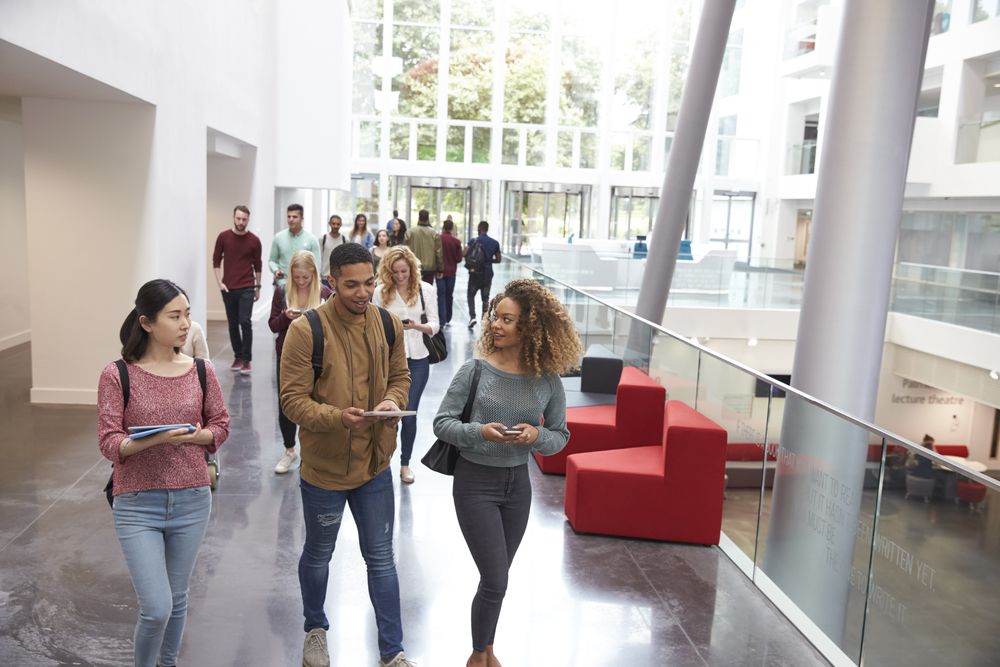What does 'welcoming students back to campus' mean?
.png/fit-in/700x9999/filters:no_upscale())
When thinking about the effects of the pandemic upon Higher Education, what has been the outcome?' Was it equivalent to a flash flood, that happens suddenly, and changes the landscape in dramatic ways? Or is it more like waves upon a beach where the sea disturbs the sand as it comes in, but appears to leave no trace afterwards?' And, either way, what does it mean for students?
Every university puts considerable time, effort, and expertise into welcoming new students, and helping them to transition into their studies. For those of us who are older, this is a stark contrast to how it used to be when students were expected to just adapt. Now, universities speak to their students in a welcoming manner; they highlight the things which students must do, and those which are optional; they have tours of the libraries to help students know how to use these facilities.' Just as importantly, they focus on the social aspects of coming to university, and are keen for students to achieve a good balance of studying with all the other parts of the experience. For students who are starting academic study this September, and are unlikely to have had a traditional transition period from school, it's important to rethink our onboarding strategies and how we can prepare students for an onsite experience.
I lead the 'Taught Student Development' team which is part of the Institute for Academic Development at The University of Edinburgh.' The 3 academic developers in the team run a programme offering 190 workshops, 260 study consultations, and 260 dissertation writing consultations to our undergraduate (UG) and taught postgraduate (PGT) cohorts.' In addition, the team work with Schools across the University to embed academic support, as well as providing expertise to projects such as changes to student support, and the curriculum transformation programme. Our experience has shown us that the pre-arrival period, and the initial few weeks of campus are a critical time for student confidence, especially with undergraduate cohorts.'
When the pandemic struck in March 2020 we had to focus on how to move our support online.' Fortunately, the team have over 10 years of experience in working with online PGT cohorts so we were able to quickly make this change. Once that initial challenge was met, we realised our incoming students would be learning online (which was not what they had expected), and wouldn't have the normal welcome period and induction experience.' With other colleagues across the University, I developed several online transition courses which covered practicalities of starting their studies; provided a welcoming environment, and offered a space for discussions and networking; and introduced core study skills. One of the courses was aimed at new undergraduate students; one was for new taught postgraduates; and a third course was developed with the University's specialists at English Language Education around English for academic purposes. Other parts of the University developed similar courses on using the Library, and Digital Skills.
In terms of teaching and learning format the courses ran in a moderated form for 6 weeks from late August (2 weeks before Welcome Week) through to week 3 of the Semester.' There were discussion boards which I hosted, with contributions from student ambassadors (who were paid for their involvement), and a series of synchronous online sessions covering topics from 'Getting a good start' through to 'How to use the Library'.' In addition, the courses all had access to a reflective journal, and students were given question prompts to encourage them to think about what skills they were bringing to the Edinburgh community, and how they wanted to learn.' After week 3 the materials were available to the students, but the discussion boards were no longer live.'
 We deliberately made the courses adaptable so that, as the situation changed, and students came back to campus, we could remove the sections on online/hybrid learning without disrupting the core materials. Over the summer of 2021, I updated the courses, and we launched them again in late August. Over the first two years of the courses running approximately 4000 students have registered for them, with interesting differences in how active different groups are.' Overall, taught postgraduate students tend to be the most active in the discussion boards and synchronous sessions.
We deliberately made the courses adaptable so that, as the situation changed, and students came back to campus, we could remove the sections on online/hybrid learning without disrupting the core materials. Over the summer of 2021, I updated the courses, and we launched them again in late August. Over the first two years of the courses running approximately 4000 students have registered for them, with interesting differences in how active different groups are.' Overall, taught postgraduate students tend to be the most active in the discussion boards and synchronous sessions.
The courses will run again for the upcoming academic year and, perhaps unsurprisingly given the upheaval of the pandemic, we are finding that our students are more challenged in terms of managing deadlines, and understanding what is expected of them. Therefore, when I updated the courses this summer, I have increased information on what it means to be learner in Higher Education, and provided a focus on good academic practice.'
In a parallel development, more time is being spent on talking to the people who have helped our students on their journey to university.'At Edinburgh, I host online sessions on 'Accessing academic support: a guide for parents and supporters'. My aim with these sessions is to acknowledge that students can't be expected to remember everything we tell them in the first few weeks of the academic year. They are overloaded with information in their first few days onsite, along with trying to establish their social networks, and find their feet.' I give the parents and supporters a basic guide to how students can get support, and remind them that when the student comes home at Christmas and says they found exams tough, or didn't give their best in their first assignments, these are the key contacts who can help them. I want to normalise the concept of asking for help ' students often feel they can't admit to needing anything. That if they ask for help it's a sign that they aren't good enough. Clearly this isn't the case, the happiest students are those who recognise when a bit of guidance would be useful, and are not afraid to ask for it.'
I'm always clear with students, parents and supporters that any support my team offers is completely confidential.' I don't do that because I think it is something to be ashamed of, rather that I know many students will not speak to us if they think we might tell anyone they've asked.'
One thing which I have become increasingly aware of about the pre-arrival period is that asking students to look at resources during this period carries implications for widening participation students.' Many of the students in this cohort are working (in order to pay for their studies) or have caring commitments which mean they may not have the time available before Welcome Week to participate.' This is why our courses are live until week 3 of the semester, with active involvement from me and the student ambassadors.' I was keen that the opportunity to work through the materials, and ask me questions, was available to students for a reasonable period.'
So, in terms of what the pandemic means for us as educators, and our students?' I think we will have to work to retain the things which worked really well during that move online ' for my team that means keeping most of our workshops for taught postgraduates in an online format as this fits better with their busy schedules.' We also re-worked all our workshops to be shorter when offered online, with more specific topics ' again this has worked well and is something we will retain. The pandemic forced us to think about what actually needs to be in-person, with everyone in the same room. The answer is that surprisingly little actively requires this format, and mainly the in-person benefits are around social aspects, and getting to know students from different disciplines.
To go back to my water metaphor, the pandemic has been like a high tide which moved everything around, and left a new environment behind.' We can now find lots of different things that were a bit hidden previously.' For our students, I hope this mean they will find it easier to understand how to access support at university; and that universities will understand more about how to be welcoming to our incoming students, and our returning cohorts.

Donna Murray is Head of Taught Student Development, Institute for Academic Development at The University of Edinburgh. Donna has 25 years of experience in the higher education sector, most of that time spent at Edinburgh where she has responsibility for academic development support to the University's cohort of over 35,000 Undergraduate and Taught Postgraduate students.' Donna is particularly interested in transitions into, through, and out of university study; and how universities can support students' self efficacy. In her work with staff, Donna focuses on the third-space - roles which are not completely academic or professional services, but a mixture of both.' Current work involves establishing writing retreats to support this group, and building a community of practise.
Further information
The Institute for Academic Development at The University of Edinburgh provides support to students and staff across the University for teaching, learning and researcher development.' In addition, the IAD is actively involved in University strategy and policy.' To contact the Taught Student team please email: IAD.students@ed.ac.uk
https://www.ed.ac.uk/institute-academic-development
English Language Education at The University of Edinburgh has over 40 years' experience in providing a wide range of Academic and Specialist English courses for international students and teachers


)
)
)
)
)
)
)
)
)